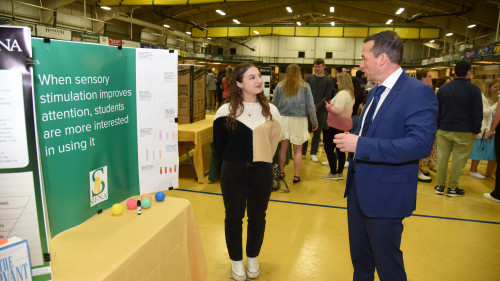
By Mike Clemens '15
Although the blockbuster film “12 Years a Slave” was recognized at the Academy Awards, Siena students were deeply engaged with this inspiring story long before the film was awarded this year’s Oscar for Best Picture.
Students in Paul Murray, Ph.D.’s First-Year Seminar course spent two months studying the award-winning film and the book that inspired it.
“This is an amazing tale,” said Murray, a professor of sociology at Siena. “It’s a very dramatic story. It is one of the most compelling documents about slavery because it is written from the perspective of someone who had had the experience of freedom prior to his enslavement.”
“12 Years a Slave” is the story of Solomon Northup, a free African-American man who was kidnapped from his home in nearby Saratoga Springs, New York in 1841 and sold into slavery in Louisiana. The book – published originally in 1853 – details Solomon’s capture, his brutal treatment at the hands of various masters and his eventual reunion with his family after being apart for twelve years.
Murray’s course is titled “Race and Rights” and he decided to incorporate this text into the class because it had such strong connections both to his goals and to the goals of the First-Year Seminar.
“We are tracing the struggle for equal rights in America, starting from slavery and ending with the present day,” Murray said. “I think that the combination of the book and the film really helped to increase my students’ understanding of what the system of slavery was like.”
“In my eyes Solomon Northup is a hero,” said biology major Samantha DePasquale ’16. “Before this class I thought that I was educated about the inequality of races in America, but I was mistaken. In Northup's story, as well as the movie, I learned things that textbooks never portray.”
During the fall 2013 semester, students read Northup’s book and wrote response papers in preparation for extensive class discussions. Their study culminated in a field trip to the Spectrum Theatre in Albany where they watched the film together.
“The film was very powerful,” DePasquale said. “At times you felt as though what was being done to the characters was being done to you. It really opened my eyes. I never knew that our history was so dark.”
Murray hopes that this project will help his students recognize inequality and work to alleviate it.
“There’s a saying: ‘Each generation rewrites history based on its own experiences,’” Murray said. “We like to think that slavery is something in our distant past, but if you look at contemporary society you can see how it still has an impact on us. I think that it’s important for students to understand this.”




